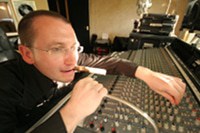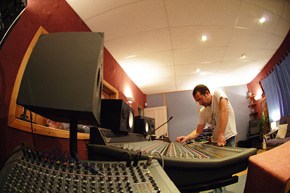A music producer is the manager of the music creation process in a recording studio.
They are responsible for working with an artist or band and committing a quality recording to the studio equipment with the assistance of the sound engineer.
In a studio environment where a band or artist is working with a sound engineer to create a recording, the producer takes the role of both project manager and executive overseeing the recording project.
The producer is responsible for making sure the artist or band co-operates with the engineer to achieve the required mix, and will work within the framework of the song or composition to tweak and improve its structure and soundscape.
A good producer has a vast impact on the quality and the composition of the finished piece.
Often he or she will have to take a “rough and ready” live band and produce a polished recording which is suitable for commercial release.
Salary
The producer will normally be self-employed, and will either be paid per day or per track, depending on the arrangement they have in place with a particular record label.
At a lower level, the producer will freelance to unsigned bands who are funding their own recording project.
At this “grass roots” stage, producers will normally bill themselves at £100-£250 per day, and depending on whether they have access to a studio, this may or may not include the cost of studio hire and an engineer.
Often, the producer will offer an “all-in” price to encourage the artist to go ahead with a recording.
An additional benefit for the producer in doing this is that they can create a synergy with a local engineer and/or studio.
This reduces costs for both parties and helps in securing future business.
Artists who approach the engineer directly to enquire about studio hire can then be “sold” the producer as part of the package.
It works both ways too, and is therefore beneficial to both producer and sound engineer.
For established producers working with internationally renowned artists with the backing of major record labels, the payment for their services can easily breach £5,000 per day or £20,000 per track.
Again the arrangement is flexible, and the studio cost itself can be negotiated in or out.
Whichever way the label chooses to play it, a top engineer is a very well remunerated talent.
Some producers are registered with production management companies who will pitch their services to labels on behalf of the producer.
This “end game” is normally reserved for the top-level producers, and the figures can become quite dizzying.
Responsibilities
- Timely arrival at studio (or other meeting point) with artist or band.
- Prepare a production plan and discuss with artist (if relevant).
- Liaise with engineer regarding equipment that may be required, and hire extra kit if needed.
- Organise the hire of session musicians if required, and brief them on arrival at the studio.
- Communicate with record label regarding development stages and time-scale of the recording.
- Work with engineer on mixing down recorded tracks into a polished multitrack recording.
Qualifications
Although there are no formal academic barriers to entry, candidates who wish to join a large professional studio at assistant engineer level will often be expected to be in possession of some form of certification.
This could be a GNVQ (higher education) certificate in sound engineering or music creation, or even an HND.
For those wishing to work freelance, it is not generally assumed to be important to have academic certification.
Most working producers stand by their track record, so a new producer who is happy to work with aspiring artists for low remuneration can quickly build at least some form of portfolio to show to other artists, studios and labels.
Producers will often be working on their own musical projects in between producing bands or soloists, which makes sense given their ownership or access to professional quality studios.
The chance of these “white labels” being published or released is quite low, but it is useful for a producer to keep the musical fire burning between studio work on paid jobs.
Skills
- Fundamental understanding of the principles of sound recording and sound engineering.
- Must be musically creative in order to advance and improve an artist’s music.
- Be able to develop strong working relationships quickly, as time with the artist is often limited.
- Be able to deliver against a predetermined development plan if working with a major record label.
- Broad musical and music production vocabulary, to enable explanation of concepts to be used within a certain recording.
- Must be a good manager of time as allowance made for studio time is often limited (and expensive).
Working Conditions
Most producers will typically work out of a studio they feel most comfortable with, and so develop a rapport with the in-house sound engineer and facility manager.
This relationship is often crucial to delivering a quality recording in line with the artist’s expectations.
Many engineers are also expected to travel, so the ability to become immersed and comfortable with the studio equipment quickly is vital in this respect.
Atmosphere within a recording studio can range from airy and relaxed to claustrophobic and stressful, depending on which studio is being used, what the artist is like to work with and the recording budget involved.
The hours are very long, and producers will typically work from 10am to midnight and beyond to achieve everything that is possible within the economic confines of the “day rate” arrangement.
Experience
Even top level producers are often self-taught, and whilst a good degree or Further Education qualification in sound engineering or music will teach the fundamentals, in many ways, being a good producer is akin to being a naturally talented musician: studio experience is better than classroom theory.
On this basis, it is possible for people who wish to become producers to simply invest in “bedroom kit”, but to achieve a recording quality at home that is on a par with a small professional studio saving thousands of pounds in equipment costs.
Digital mixing on computer has made the design and implementation of the home studio quicker and more simple, but the purchase of an Apple Macintosh with a decent digital mixing board and various outboard effects is not to be confused with a cheap means of entry into the world of music creation.
Rates of pay rise with past experience and a producer’s portfolio of previous project work, so it’s a case of biding one’s time and making the most of long-term career-boosting opportunities, even if the remuneration offered for a particular project may seem unfavourable at the time.
Image

Also known as…
- Recording producer
- Music producer
- Artist production supervisor
Related Jobs
- Sound Engineer
- Artist manager
- Record company manager
- Session Musician
What’s it really like?
Kiron J is an internationally renowned music producer who has worked with Sony BMG, Universal Music, Albany Down, Jesus Loves You, Urban Flavas and legendary engineer, Pete Booker, at Arcade Studios.

What made you decide to choose to get into this sort of career?
Being a freelance record producer was a natural progression from the various roles I’ve had in the music industry. Starting out as a guitarist in a band at the age of 16 gave us access to a professional recording studio, engineer and producers.
Some years later we ended up on Top of The Pops and several other TV shows of the time with Boy George.
Being a member of PRS (a royalty collection society) and the Musician’s Union was vital to receiving both royalty cheques and payment from the various shows and live performances we did with George.
The nineties saw dance music take off in a big way, and I immediately plugged into the whole scene, producing various 12” records for various labels.
Most of the record deals I secured were through independent labels which advertised in various magazines like Sound On Sound and Bandit.
Do you have a standard day or a standard type of `exercise’?
Each day is different, in the respect that producing a solo artiste varies from producing a band.
Then there are other days where I have to administer.
Being self-employed requires a variety of skills, such as accounting, promoting and securing future work through formal and informal meetings.
What is the most common type of problem/call-out/exercise you must attend?
The tendency with one’s own business is to work extremely long hours.
This is a problem common to many people who freelance in various professions.
The key is to be self-disciplined with regards to holidays and weekend breaks.
It’s important to take time out to prevent yourself from becoming burnt out.
What do you like most about the job?
The actual time spent in the studio creating a piece of music.
This sounds quite obvious but as your business becomes more successful, it seems as if it is harder and harder to spend time actually producing material.
What do you like least about the job?
The administration can be a constant headache.
Please see my comments above!
What are the key responsibilities?
Making sure a project is totally complete, which involves personal guidance, encouragement and trust.
It is great to work with a band where there are no ego trips, where everyone gets along and the project can progress.
It is the responsibility of the producer to ensure that progress happens, even under trying circumstances.
I pride myself on being easy to work with.
What about academic requirements? Any formal demands, eg- A Levels?
No qualifications!
In fact I failed all the exams at school!
Who is the longest serving member in your team/division?
Pete J. Booker, who is also a producer and engineer.
We work together regularly at Arcade Studios in Essex.
It is very important to preserve those relationships which work well, because it puts the artist at ease, and makes it easy to collaborate on project work and secure further jobs.
What is the starting salary and how does this increase over time with promotion?
Income fluctuates year to year depending on the number of clients; suffice to say I can support a family of four.
Income also depends on how successfully you are able to manage your own time, and the level of commitment you invest in your own business.
It is much more rewarding to work long days for yourself rather than for someone else.
I try and offer value to the people I work with also, as this helps in creating a long-term partnership.
If the artist is happy that they are receiving a value-for-money package, then it forms the basis of a good working relationship, and for the producer, the chance of repeat business.
If you left this position, what else would you consider/prefer doing?
With my extreme lack of academic qualifications, it’s not an option for me to leave this position!
I do not even want to think about it!
How far is it possible to progress within this type of career?
Progression is limitless when you’re self employed.
Universal Music, the BBC and Sony Music are but a few of the clients I’ve worked for.
What advice do you have for someone who is looking to get into this as a career?
Sheer tenacity! Stick with it!
What are the most important qualities an applicant should possess?
A real sense of listening – both to the client and to the music itself.
Any closing comments or thoughts?
The music industry is in constant flux and one must adapt to meet the needs of the clients, and to find new ways of making money through producing music.
Through years of experience, many secrets are unlocked; hence I’ve been able to survive for such a long time within the industry.








